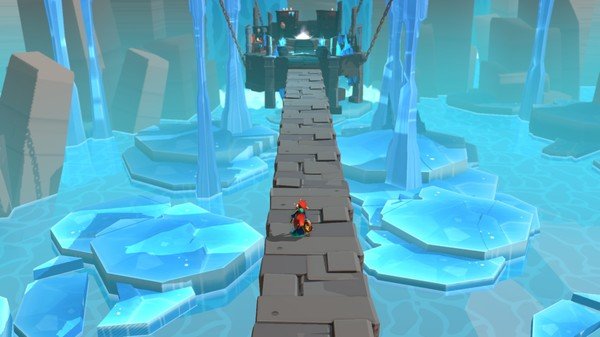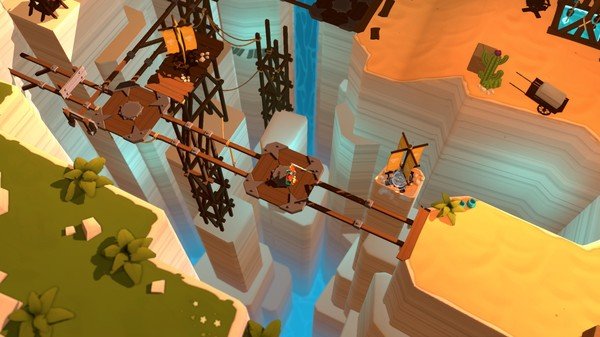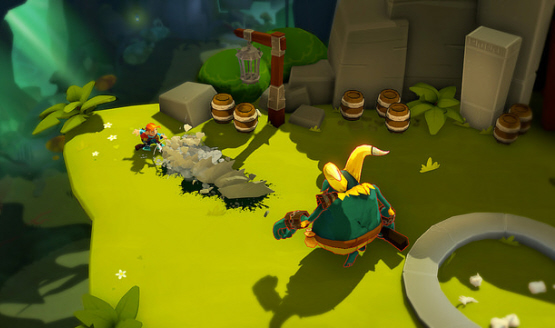Spellcasting action-adventure title Mages of Mystralia recently released on PlayStation 4, and we wanted to know more about Borealys Games’ latest title. In order to learn about the script written by Ed Greenwood, the game’s unique mechanics, and its trophy design, we talked to game director Patric Mondou about it.
Check out our full interview with director Patric Mondou below!
PlayStation LifeStyle: The game is all built around spellcasting. Why did you decide to go in that direction?
Patric Mondou: This was actually the starting point of the whole project. We had this idea of making a game that would really nail the experience of “being a mage”. We knew of a few games that somewhat succeeded, and we loved playing Magicka, but we felt that no game universe so far had succeeded in creating a poper a magic system per se; an intellectual process in which players need to understand the “inner workings” of magic. We started by designing the system, then pretty much built the rest of the game (genre, gameplay, story, art) around it.
There’s so much depth to the spellcasting system, but it’s also quite intuitive. How difficult was it finding that balance, and how many iterations did that core feature undergo during development?
Quite a few iterations, indeed! In fact, the magic system in its final form was only achieved a few months before we launched the game. The first iterations of the system were only done on paper, and they revealed major balancing problems and technical loopholes. A year into development, we had a first version running in a sandbox. It was quite complex and allowed for pretty much any spell imaginable, but it was noisy and hard to understand. More importantly, it was plain boring in the game itself, since the core design caused the spells to have very slow casting times. We then went for something much simpler, tested that with players and iterated from there, adding complexity in layers until we were satisfied with the depth. That’s about when we showed the system publicly for the first time, at Pax East 2016.

One thing that really stands out is the gorgeous visuals. It really brings out the fantasy world. How important was it to you that the world was able to capture the players’ imagination as they explored?
Magic is all about amazement, fantasy and imagination. We thought that European comic books were a great reference point to capture that. We knew from the start that we wouldn’t be able to make next gen graphics with our small team, so we initially aimed for something very weird : cardboard characters and props (in the style of Paper Mario or Don’t Starve). We later found out that it was very frustrating to aim projectile spells when our character can only face four directions. We decided to hire one more artist and go for full 3D, but we kept the subtle storybook finish.
What other games have inspired you as a developer, and what games impacted Mages of Mystralia?
Diablo 3‘s rune system was a starting point for us, because we felt that the runes in that game came very close achieving what we had in mind, had they not been bound to individual spells. Magicka, Path of Exile and puzzle games in general were also very good references. When we started building out the actual levels (along with dungeons and puzzles) our attention switched to the Zelda series because of their very iconic progression system consisting of items and progression blockers. It was a natural way for us to pace the player’s progression with the spell system. Even in its current state, our spell system is still quite complex. Giving out runes one by one and making sure that players understood them properly was mandatory for us.
PlayStation gamers love going after trophies, but that’s probably not at the top of your mind when developing a game. What’s your philosophy towards achievements & trophies, and when do you really start thinking about implementing them?
We had crazy ideas for achievements since the beginning of production, but I think we started implementing them too late in production, so some of our achievements remained quite “mainstream” or predictable. Ideally, I think achievements should mostly reflect the game’s core mechanics. If your game is an exploration game, your achievements should probably imply discovering funny, unusual and rare spots. I would have LOVED for all our achievements to be about designing cool spells or using them in an unusual way.

The game features an incredible orchestral score conducted by Shota Nakama. Can you speak to how important music is to the experience, and what it was like working with Nakama?
Whenever I think of a very good game that I played as a child, music is somehow one of the clearest memories I have of it. It is a huge part of the player’s experience and we really wanted it to shine. Our composer Antoine did an amazing job and even though the soundtrack already felt very strong with sampled instruments, he’s the one who pushed for studio recording. He secretly poked Shota Nakama (Antoine is an admirer of his work) and before were knew it, we were in Boston recording with a live orchestra. Shota was incredibly generous. He suggested some arrangements and modifications and walked us through the process, because live recordings were really not something we had much experience with.
You released first on Steam earlier this year, and the game got a very positive reception from fans. How satisfying is it to know that a game you poured so many hours into was able to resonate with people?
Obviously, it was a huge relief to see those user scores come in. I always have the player’s experience in mind while working and getting positive feedback from them is, for me, much more important than sales or anything else. I really hope that in the future, some people will play a spell crafting game and remember us and say “Oh yeah, I remember that game Mages of Mystralia did that especially well.”
How difficult was it getting the game ported to PS4? Was the porting process easier or more difficult than expected?
Easier… I think! It was very long, but it was surprising how quickly we were able to get the game running on the development kit. What took some time was the optimization, mostly. I’m also very grateful to SCEA because they were very reactive as soon as we reached out to them. They sent us dev kits, documentation and always answered our questions promptly.
The story in Mages of Mystralia was written by the legendary author Ed Greenwood. How did that collaboration happen, and how exciting was it to have such a renowned fantasy author involved?
We still can’t believe it happened! It all started when we saw a youtube video by Ed (we’re big fans btw) where he was basically suggesting that he was longing for new projects. Since we had a video game project about magic and since he’s created one of the most iconic spellcasters in fantasy literature (Elminster), we sent him an email and a demo of our spell system. I think it took less than 24 hours before he replied excitedly. He immediately offered to join the project. In just a few weeks, we were swarmed with over 50 thousand words of lore, descriptions and dialogues (even though the contract we signed only covered half of that). Working with such an imaginative author was a great experience for us.
The floor is yours. Tell our readers why they should check out Mages of Mystralia now that it’s out on PS4!
Well guys, if you’re looking for a game that allows for creativity and ingenuity while remaining an adventure, you have to put Mages of Mystralia on your list! In my experience (with my own kids) it’s a great family game, too. Some of the aspects of spell crafting in Mystralia are reminiscent of actual programming principles, but made accessible to everyone, even young kids. On the other hand if you’re in for a challenge, the Archmage mode will satisfy the hardcore gamer in you!
But most importantly, this game was made with passion. We at Borealys have grown up with the NES, SNES, Genesis, PS1 and so forth, and I truly believe that our love for old school games is reflected strongly in Mages of Mystralia.
PlayStation LifeStyle would like to thank Patric for taking the time to do the interview about Mages of Mystralia. The game is available now on PlayStation 4.




